Planning a trip from Australia down to the wild landscapes and turquoise waters of Tanzania (including Zanzibar)? Great choice! But before you pack your safari hat or beach towel, you’ll want to know how the visa situation works. This guide will walk you through everything you need to know about the Tanzania eVisa for Australia citizens – what it is, how you apply, the cost, pitfalls to avoid and more. Think of it as your pre-trip travel buddy.
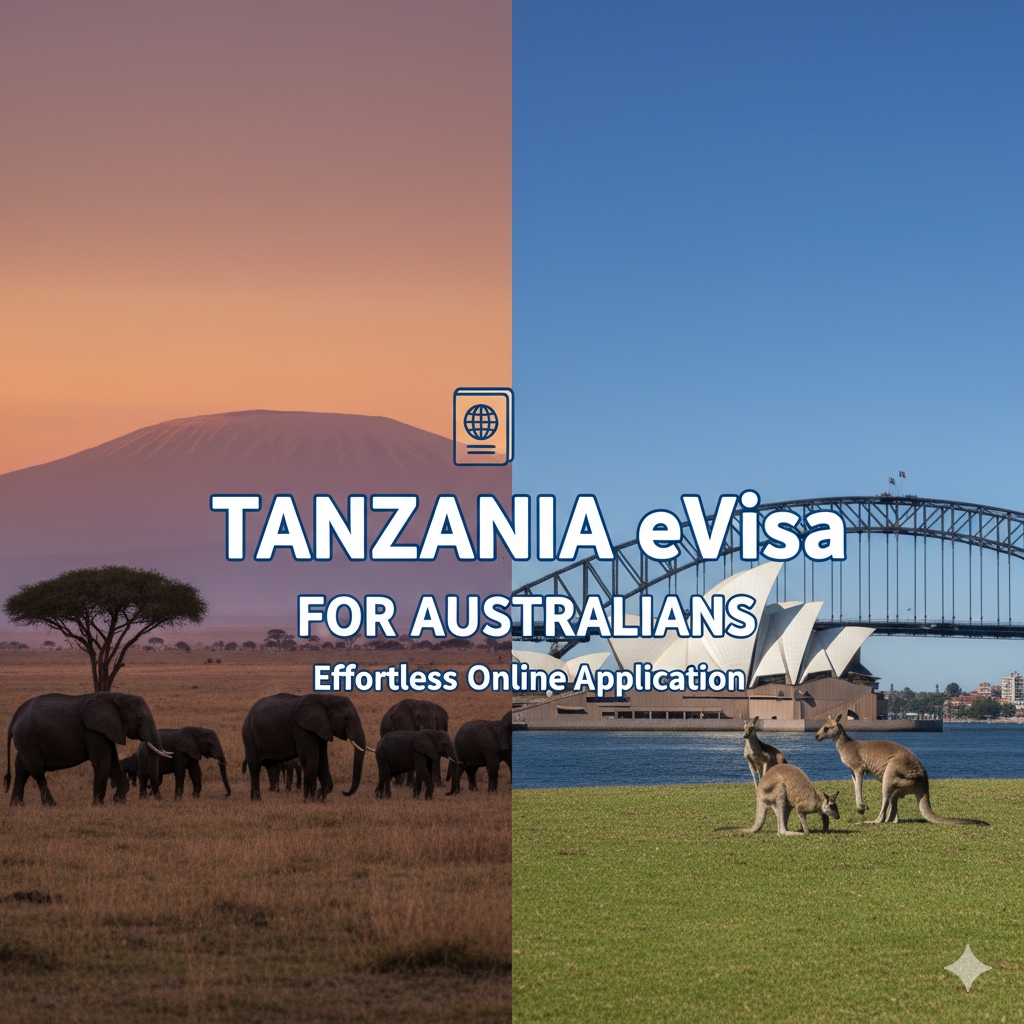
Do I need an eVisa to visit Tanzania from Australia?
Yes – if you’re an Australian citizen planning to visit Tanzania (either the mainland or Zanzibar) you will need a visa, and you are eligible to apply for Tanzania eVisa.
The online portal confirms that Australian passport holders are “eligible for e-Visa” and that a visa is required.
So yes, plan to apply ahead of time rather than hoping for visa-free entry.
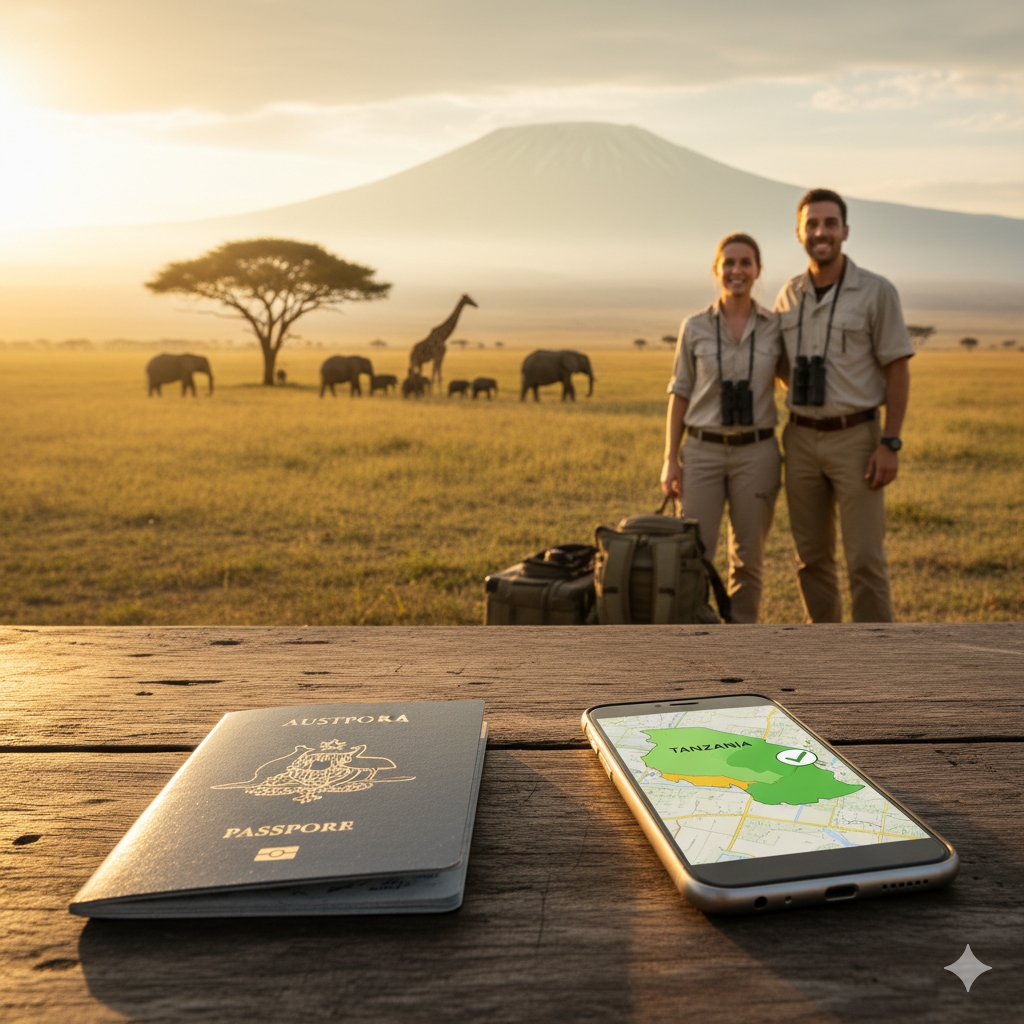
How can Australian citizens apply for a Tanzania eVisa?
Here’s a step-by-step (friendly) run-through:
Check your passport: Make sure your Australian passport has 6 months' validity from the date you intend to arrive in Tanzania. Many sources emphasise the “6-months rule”.
Fill the Tanzania eVisa application form online: You’ll provide details such as your full name, date of birth, passport number, arrival date, travel purpose (tourism/business/transit). The system supports applicants from Australia (Australia appears in the country list).
Upload any required documents: Typically these include a good digital copy of your passport data page, a recent passport-size photo, details of travel (arrival date, flight if asked), maybe accommodation details.
Pay the fee: Payment is made online (usually in USD) via credit/debit card or other methods. Make sure you’re on the official government site so you’re not paying extra service-fees to a third-party.
Receive the eVisa (Grant Notice): Once approved you will get an email with your eVisa approval (often PDF) which you should download and print.
Carry the printed eVisa + passport when you travel: On arrival in Tanzania you’ll show your passport + printed eVisa approval to immigration.
Enter Tanzania: Provided everything is in order (passport valid, visa valid, arrival point permitted) you’ll be admitted.
One tip: because the system sometimes has delays (or glitches) many travellers apply at least a week (or more) in advance. More on timing later.
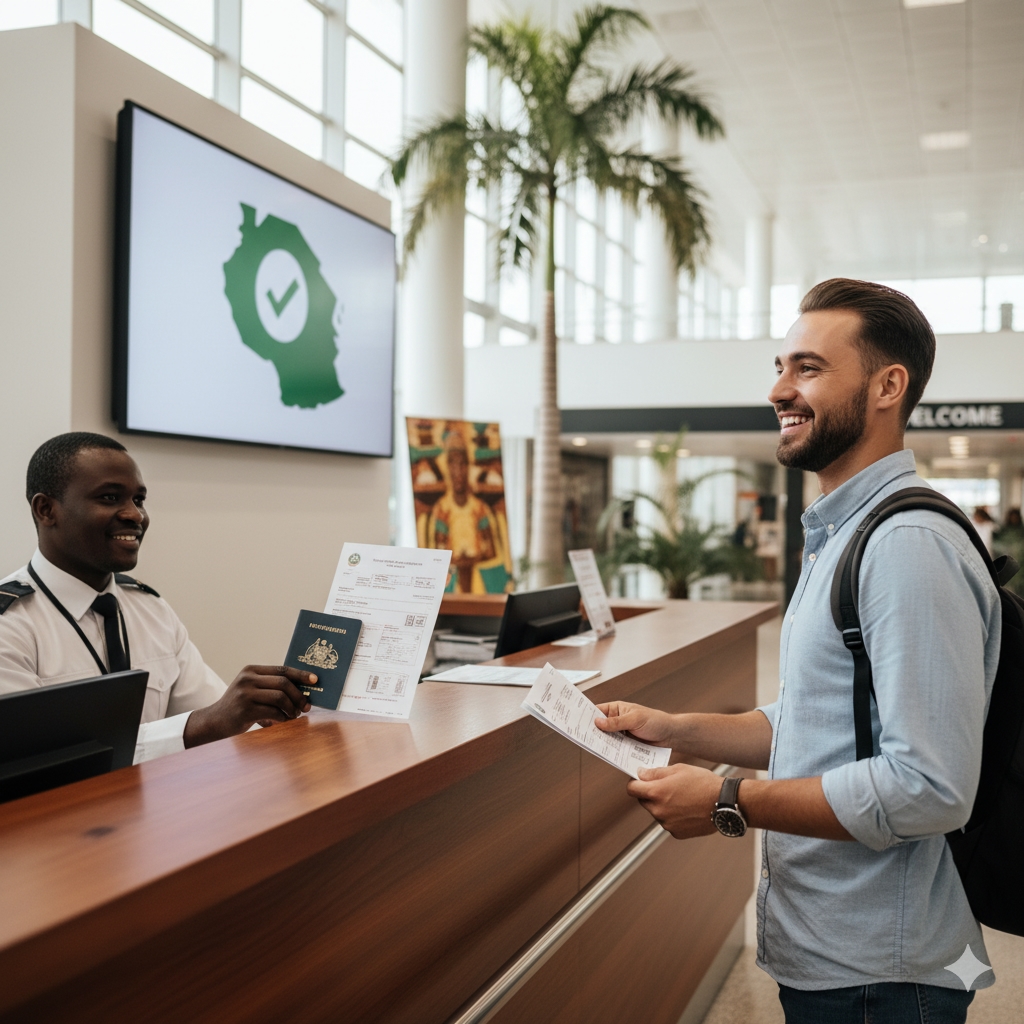
What is the processing time for the Tanzania eVisa for Australian citizens?
Because while the process is online, you don’t want to leave it to the last minute. For Australians, sources suggest the Tanzania eVisa processing time is roughly 4-7 business days if everything is correct.
Another source (for general travellers) indicates “3–5 business days” for eVisas.
However, anecdotal reports suggest delays can happen (payment issues, form errors, system glitches). For example:
“I applied for Tanzania eVisa … when I check the status it still says ‘Application on Progress’ (knowing that processing time is only 10 days max).”
So – apply early, allow buffer time, especially if you’re travelling during peak season or arriving via a less-common border.
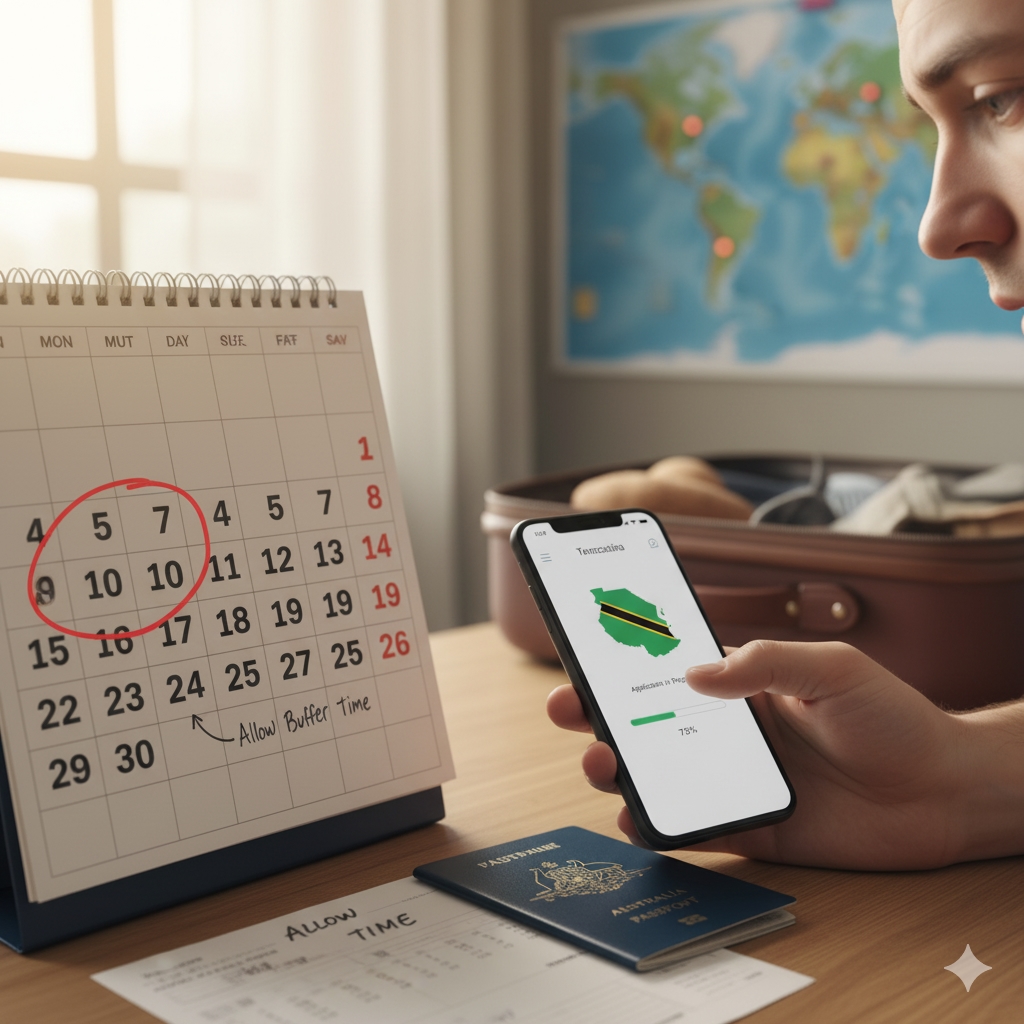
How much does a Tanzania eVisa cost and entry for Australians?
Here are the latest approximate figures for Australian travellers– always double-check at time of application as fees may change:
Single-entry ordinary tourist eVisa.
Multiple-entry eVisa (if eligible)
Business visa (single entry, up to 90 days):
Transit visa (short stay, passing through)
One source gives more Australia-specific fee examples (though some may reflect agency mark-ups) but the official Immigration fee sheet indicates the “Ordinary Visa” fee for tourism is for most nationalities.
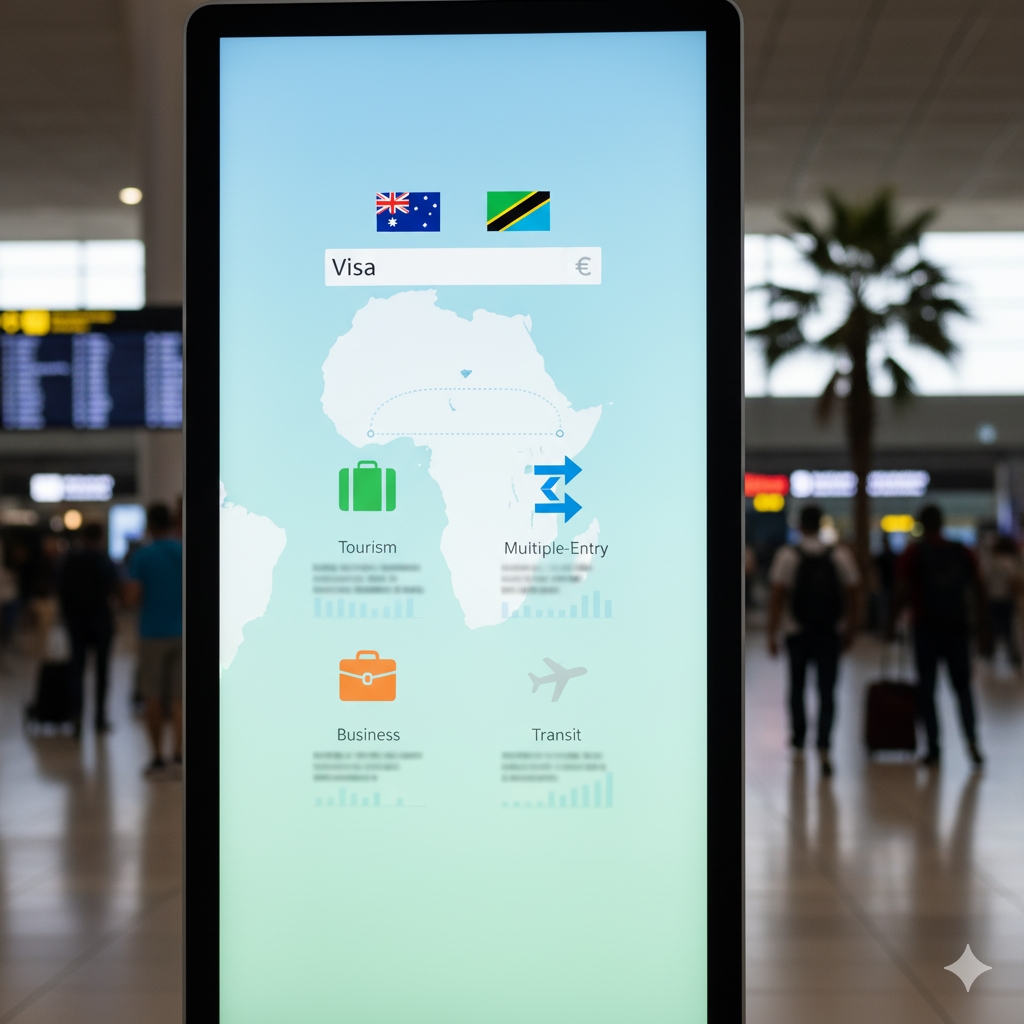
What documents are needed to apply for a Tanzania eVisa from Australia?
Good to know what you’ll need – you’ll want everything ready before you click “Submit”. Typically for an Australian citizen the following apply:
A Valid Australian Passport: To begin with, have you checked your passport? It shall have a validity of 6 months before the day you intend to leave Tanzania.
The Completed eVisa Application Form: The second step is to complete the online eVisa form. Check all the details including full name, date of birth, passport number and contacts thoroughly and then send.
Yellow Fever Vaccination Certificate: Tanzania does not regard health regulations with less seriousness and most of the travelers are required to be evidenced with a Yellow Fever vaccination.
In short, the documentation is pretty standard. The key is ensuring the passport is valid, the information you fill out is accurate, and you apply through the correct online portal.
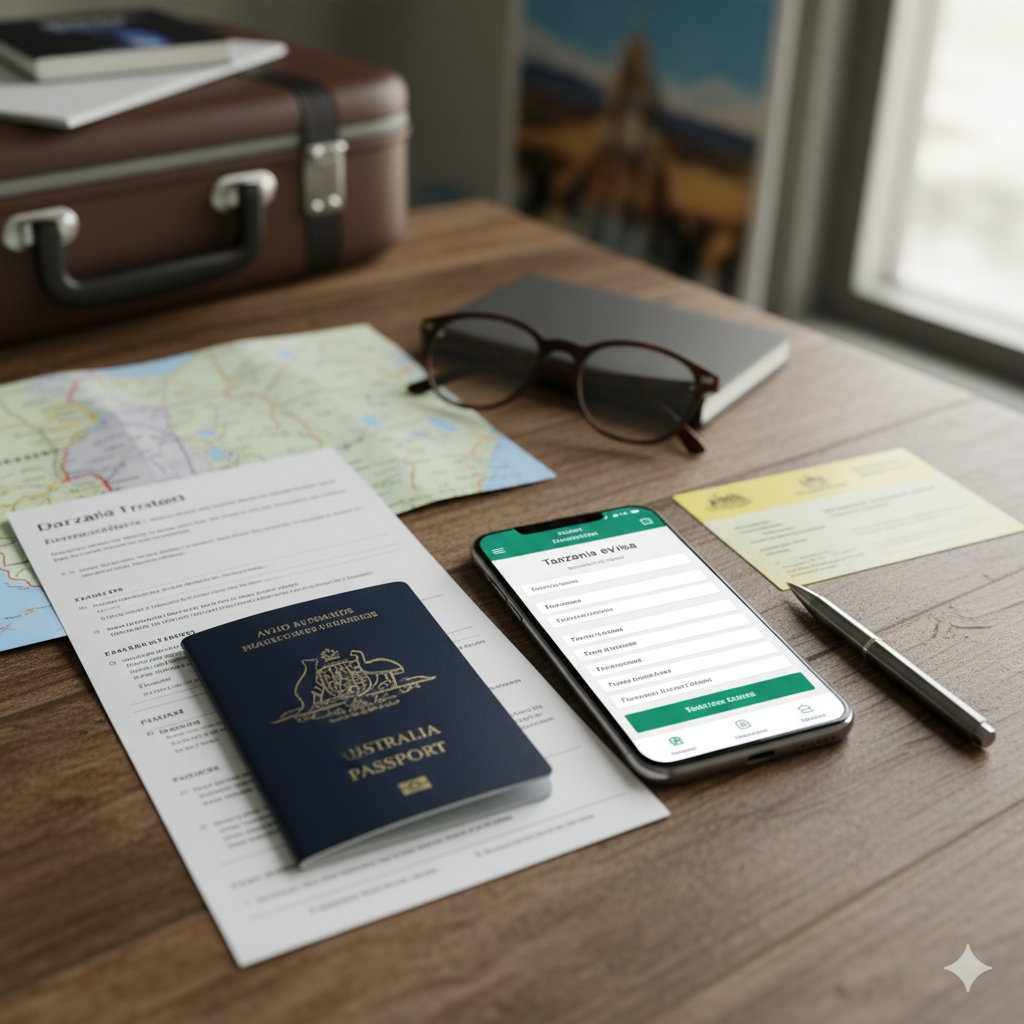
Is the Tanzania eVisa for Australians valid for multiple entries?
Here’s where things get a little nuanced: for certain nationalities, multiple‐entry eVisas are available, but eligibility depends on the country and visa type. For Australian citizens:
Many sources list the “Ordinary Tourist eVisa” as single-entry (stay up to 90 days) for most nationalities.
The official immigration site states that a “Multiple Entry Visa” is mainly issued to persons whose nature of business or circumstances require frequent visits, and historically this has often been for US citizens.
One Australia-specific guide quotes “Multiple Entry Visa” for Australians.
However: It’s always crucial to check the approval notice you receive – if your granted visa says “Single Entry” you cannot assume you can re-enter. A general independent resource says:
“A Tanzania eVisa can allow either single or multiple entries, depending on the visa type selected during the application process. Note that some nationalities are not eligible for Multiple-entry eVisas…”
Bottom line: For many Australians you’ll likely receive a single-entry eVisa unless explicitly offered and approved for multiple entry. If you travel in and out of Tanzania multiple times you should verify eligibility before you apply or choose the multiple option (if available).
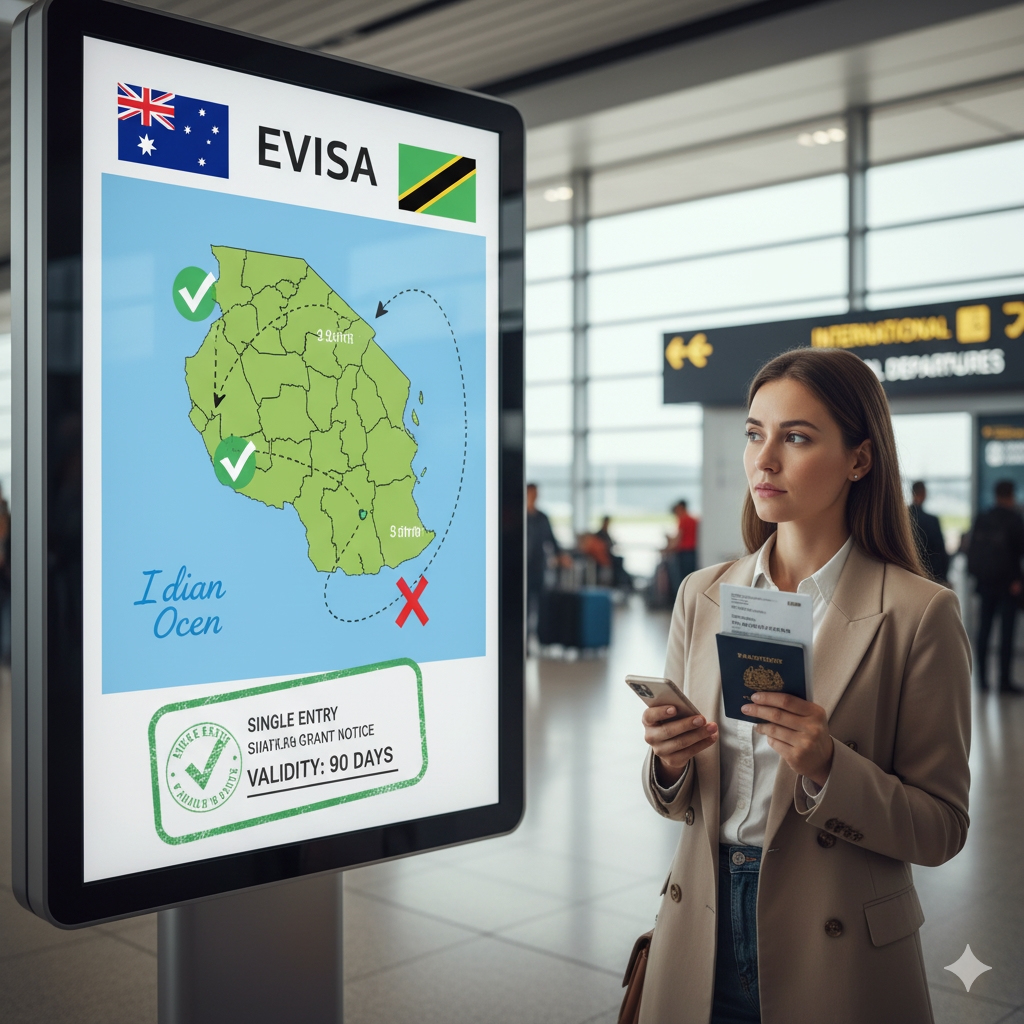
Can Australian citizens get an eVisa for Tanzania on arrival?
Yes – but with caveats. While your best route is to apply for the eVisa in advance, Tanzania does allow Visa on Arrival (VOA) at certain entry points for many nationalities.
Key points:
If you arrive without a pre-approved eVisa you can still get a visa at the airport or border, but this may involve longer waits, paying the visa fee at the counter, and possibly dealing with more scrutiny.
Not all land borders or entry points may support VOA or the eVisa format may be required. One traveller forum notes that eVisa at some land borders may not be accepted.
If you apply for VOA you should still have passport validity, onward ticket, and cash for payment.
So yes – you can, but for stress-free travel it’s recommended to apply online ahead of time.
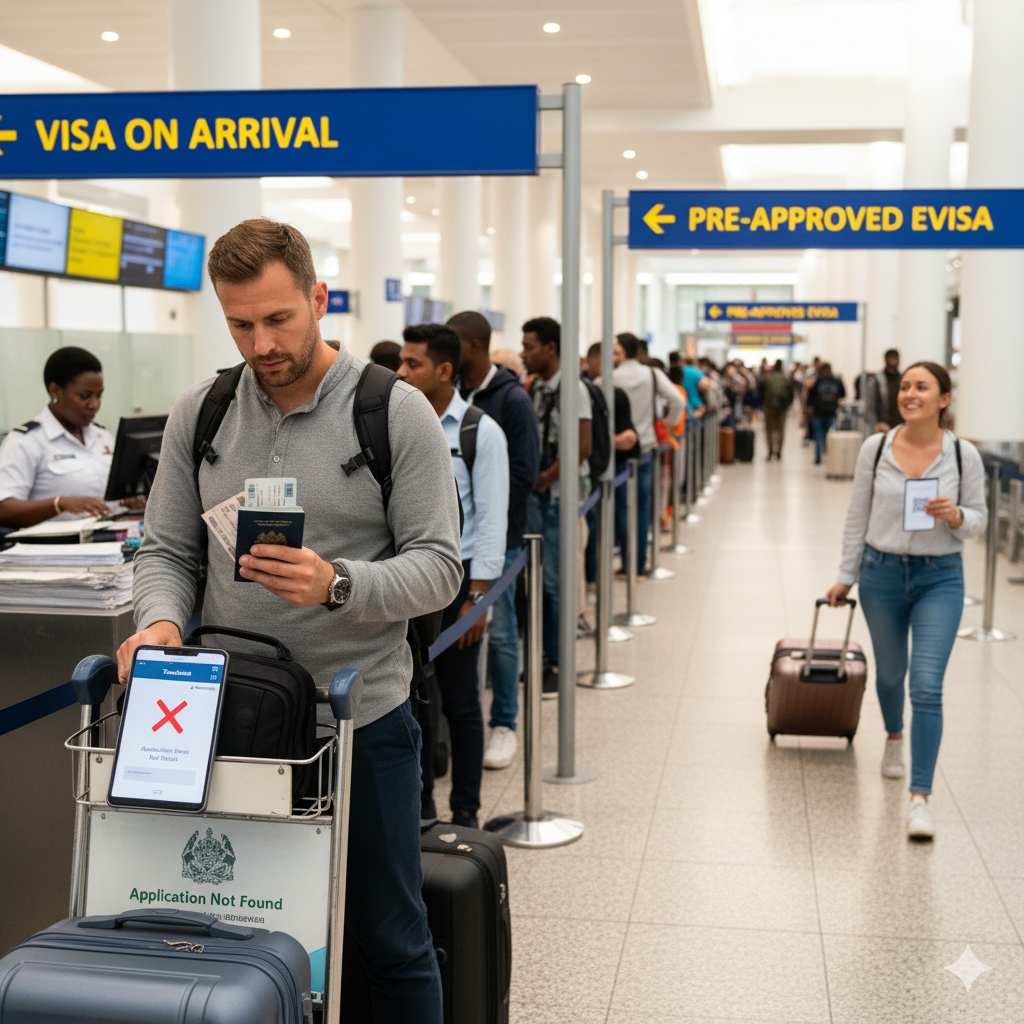
What happens if my Tanzania eVisa application is rejected?
Good to be prepared for this possibility (though many travellers are approved). If your Tanzania eVisa is rejected:
You will be notified via email (the eVisa system says you’ll get a notification if accepted or rejected).
You may re-apply, but you’ll want to find out the reason for rejection (e.g., incorrect info, insufficient documentation, passport validity issue) and correct it.
If you still have time before travel you can apply again for a new application.
If you are near travel date and time is short, you may need to plan for obtaining visa on arrival as a back-up (if VOA is permitted at your entry point).
Rejection doesn’t always mean you cannot travel, but it does mean you must sort the visa issue before boarding or risk being denied boarding/entry.
Pro tip: Avoid last-minute applications and ensure all data is correct to minimise chances of rejection.
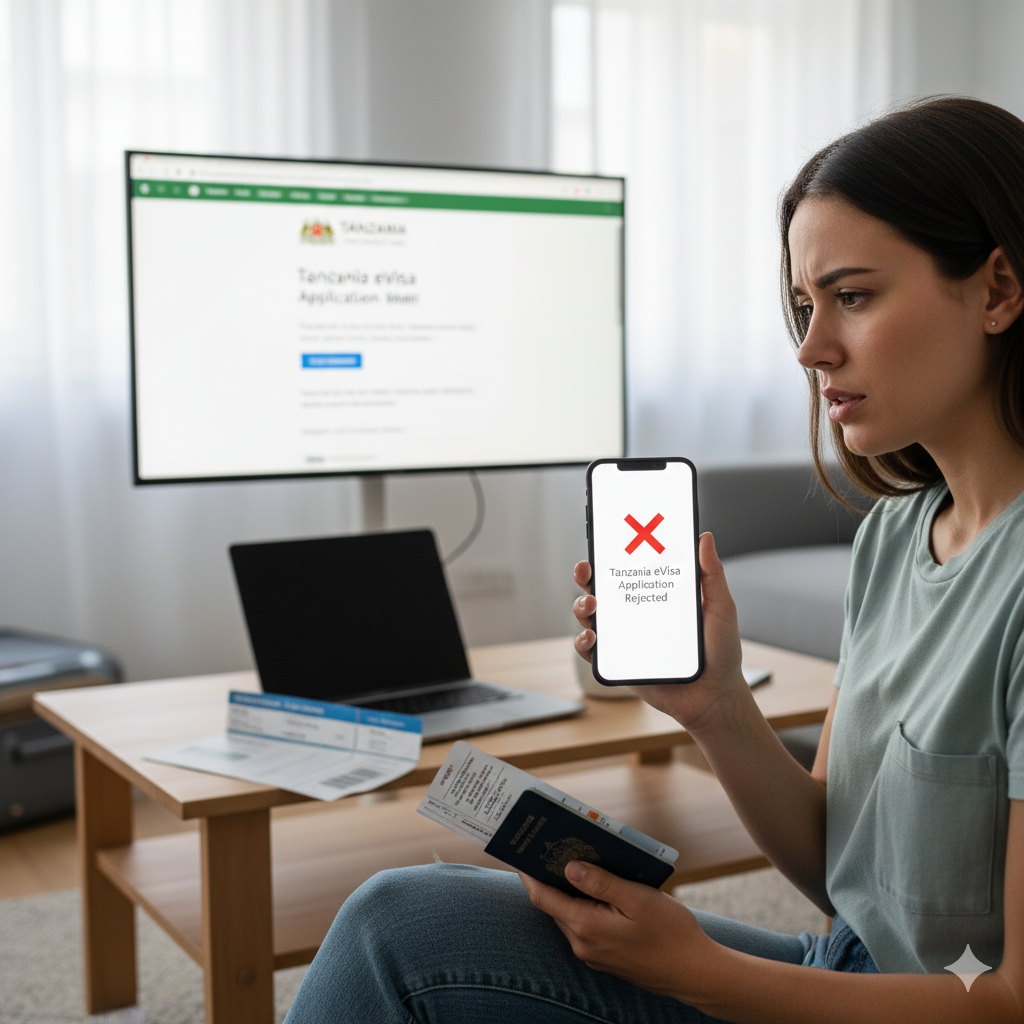
Is the Tanzania eVisa for Australians valid for tourism and business purposes?
Yes – the eVisa covers multiple travel‐purposes, but you must apply under the correct category for your purpose:
Tourism eVisa: For visiting Tanzania for holidays, leisure, sightseeing, visiting friends/family. The ordinary tourist eVisa covers this.
Business eVisa: For Australians travelling to Tanzania for short-term business, meetings, conferences, etc. (but not full employment). The business visa category exists and has its own requirements/fees.
Be careful: If you apply under the “tourism” category but your actual purpose is business (or vice versa), you risk problems at immigration. If planning business travel, select the business category.
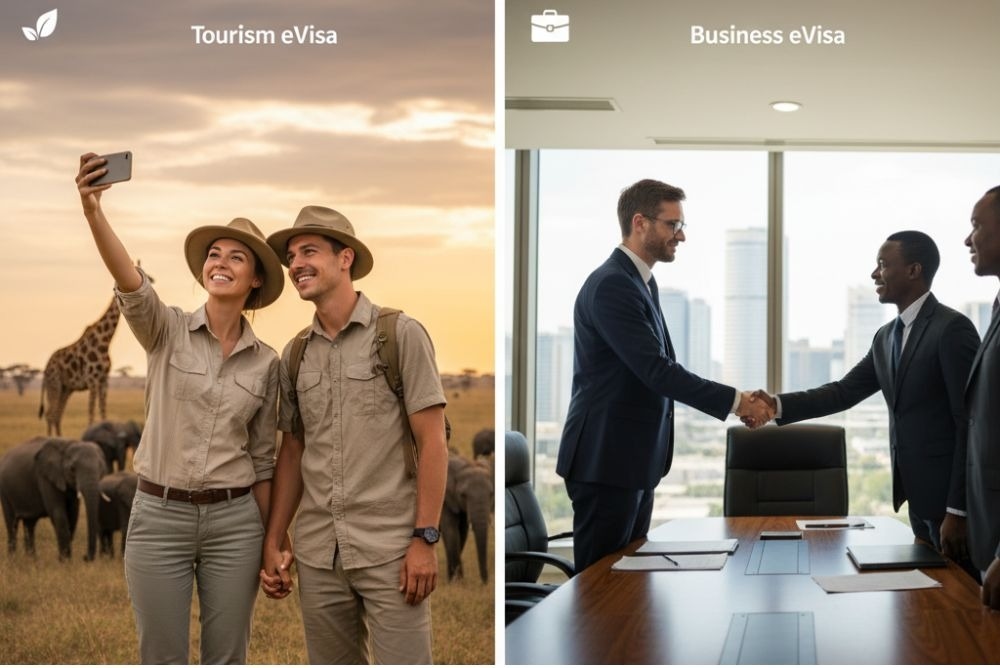
Can Australian citizens extend their Tanzania eVisa?
Yes – but with limitations. According to available sources:
For the ordinary tourist eVisa (single entry), you may apply for an extension once you’re in Tanzania, via the Immigration Office (Dar es Salaam, Zanzibar, Arusha).
For multiple-entry, business or transit visas, extensions may not be permitted (depending on your visa type). One source says: “Not possible for Multiple-Entry, Business, or Transit eVisas — you must leave and reapply.”
So if you intend staying longer than your visa allows, plan ahead and check exact conditions. Overstaying without approval risks fines, deportation or future entry difficulties.
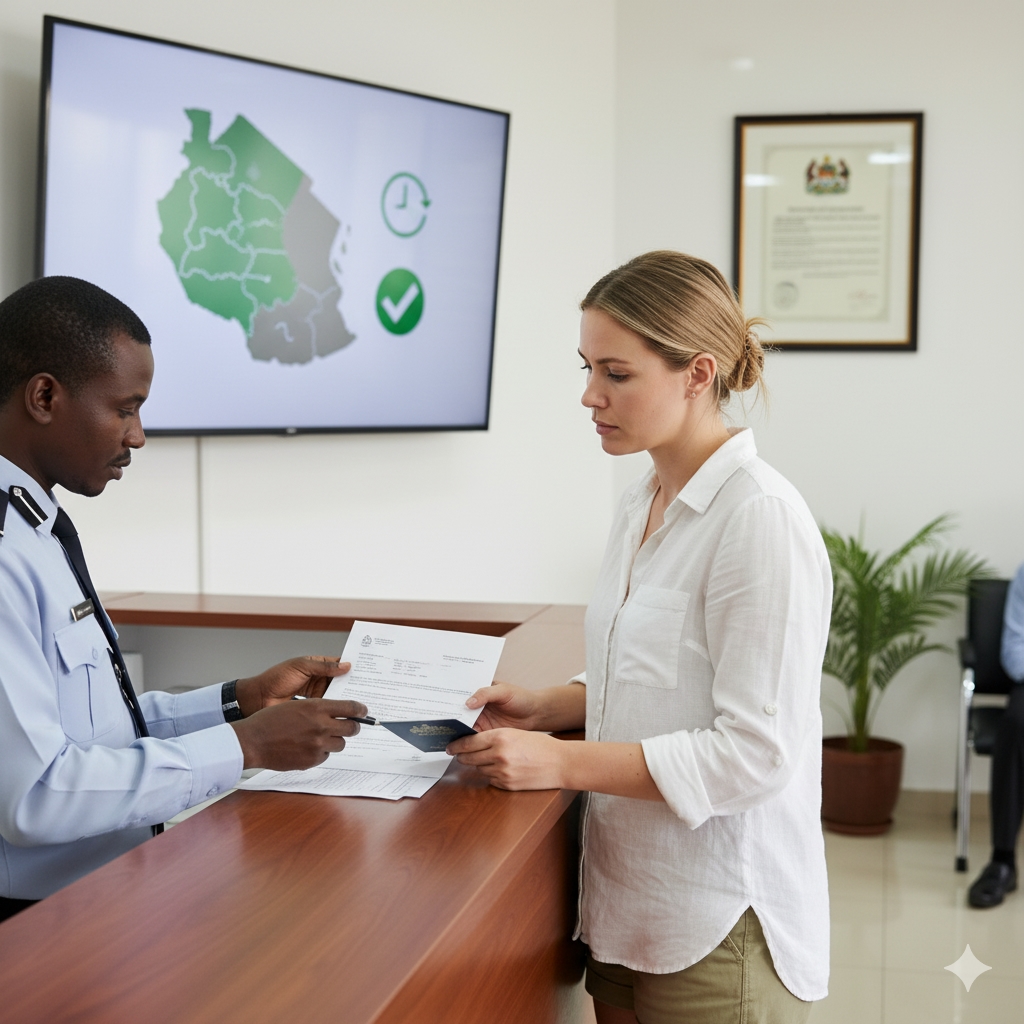
What happens if I make a mistake on my Tanzania eVisa application?
You’ll save time and stress if you avoid these pitfalls:
Passport validity too short: If your passport has less than 6 months validity from arrival date, you might be rejected.
Wrong/typo in passport number, name, date of birth: These errors cause delays or rejections. One traveller reported:
“I put in my passport date of expiry wrong and ended up needing to essentially re-apply and pay again on arrival.”Paying via unofficial agency with high fees: Make sure you’re on the official government site and pay the correct fee. Some travellers warn of “rip-off” sites.
Leaving application too late: If you apply the day before travel you may face delays or have to use VOA instead.
Assuming multiple-entry when you only have single-entry: Check your approval letter carefully to see how many entries are allowed.
Not printing the eVisa/Grant Notice: Immigration may ask to see a printed copy (or at least PDF on your device) plus your passport.
Choosing a different entry point: Some land borders may not accept eVisa or may require special process. Plan your arrival airport/border accordingly.
Overstaying your allowed days: If your visa allows stay up to 90 days, leaving later is risky.
Assuming business activities are allowed under tourist visa: If you’re doing meetings or conferences pick the business category.

Do kids need a separate eVisa for Tanzania?
Yes — each traveller, regardless of age (including infants and children), usually needs their own visa – or at least their own application. While some countries allow child discounts or “under-12 free” etc, for Tanzania you should treat each family member individually. When you fill the online form you’ll list each person’s passport details.
It’s best to check the official site for any minor-specific rules (such as parent/guardian consent) but for all practical purposes, yes: one application per person (including kids).
Also keep in mind children will need regular travel documents (passport) and meet health/vaccination rules.
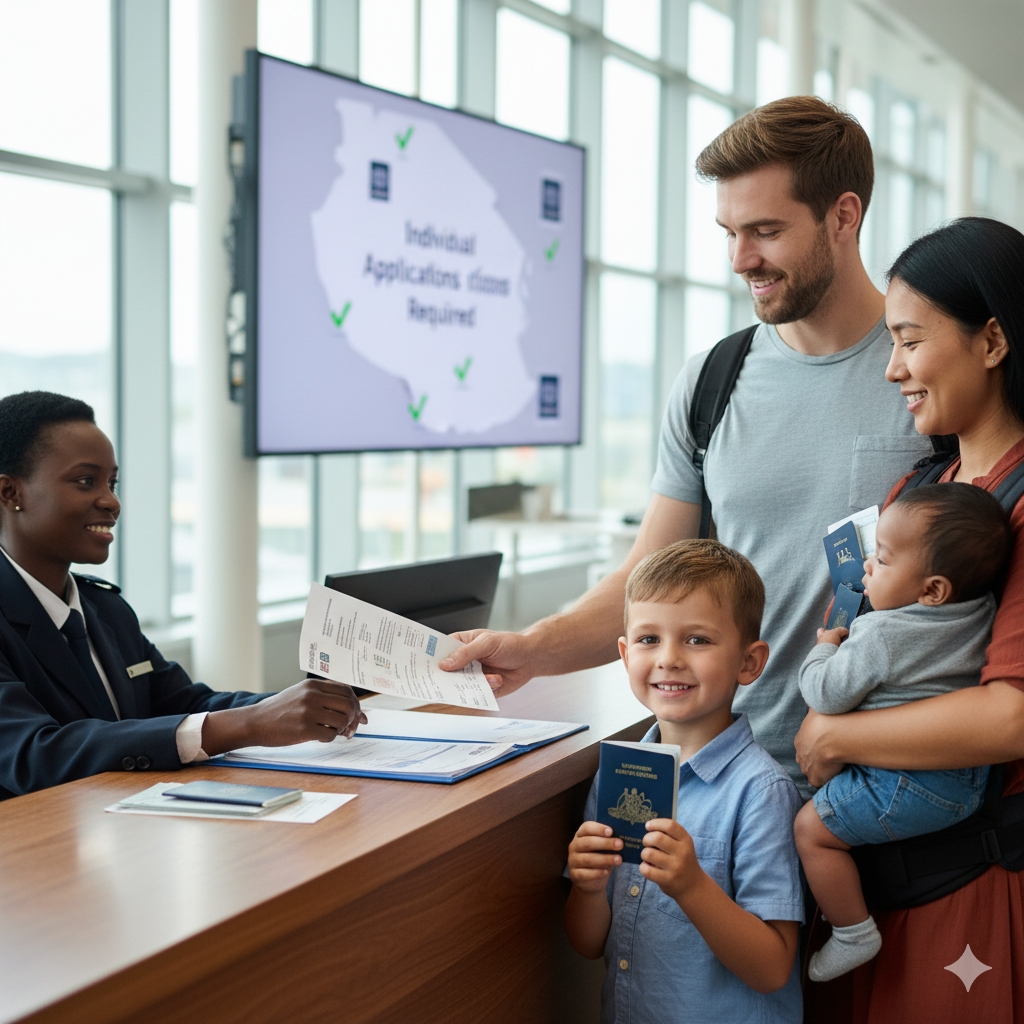
Do Australians need to print their Tanzania eVisa before traveling?
Yes — it’s strongly recommended that you print the confirmation/Grant Notice of your eVisa and travel with it, along with your passport. The official site says the approved visa will be sent electronically and you are required to present it at the port of entry.
Some travellers have been accepted with presenting a digital copy on their phone, but printing is safer (immigration officers sometimes prefer paper).
In your carry-on documents, include:
Passport
Printed eVisa approval pdf
Travel itinerary (if asked)
Accommodation/return ticket proof (good to have)
Better to be over-prepared than face a hitch at the border.
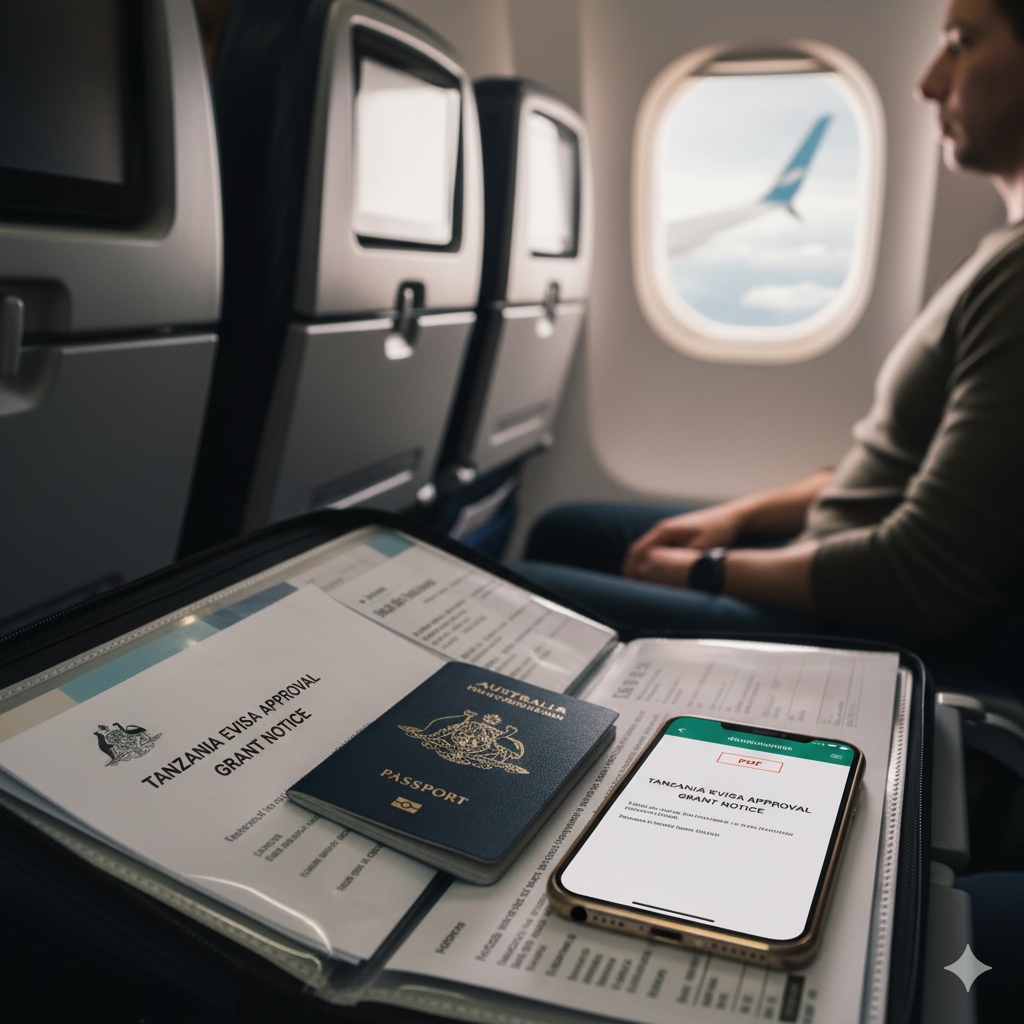
What is the best time to apply for the Tanzania eVisa as an Australian citizen?
Here are some guidelines for timing:
Apply at least 1-3 weeks before travel: Since processing is generally 2-10 business days, applying a few weeks ahead gives buffer.
Peak travel seasons: If you’re travelling during Tanzania’s high-season (e.g., June-October for safaris, December-January) or entering via busy airports, allow more lead time.
Avoid last-minute rush: Payment or form issues take time to fix – applying a day before flying is risky.
Entry point matters: If you’re arriving at a less-common land border, allowing extra time for any unexpected checks is wise.
Health & vaccination: If you need yellow‐fever vaccine or other health clearances, factor that time in too.
In short: as soon as your trip is confirmed and travel dates fixed, start your eVisa application.

Travel Tips for Tanzania (for Australians)
While you’re planning your visa, it’s also a great time to prepare for the travel side. Here are traveler-friendly tips geared to Australians heading to Tanzania:
Health & vaccinations: Make sure your routine vaccinations are up to date. Some travellers to Tanzania also get yellow-fever vaccination (especially if coming via a yellow fever country) and malaria prophylaxis if heading to safari zones. One source emphasises you’ll need to check if you’re coming from a yellow‐fever risk country.
Currency / payments: Tanzanian Shilling (TZS) is the local currency. In major cities / tourist zones you’ll find ATMs and card acceptance, but in remote safari lodges you may need cash.
Electricity plug / voltage: Tanzania uses 230 V (same as Australia) but plug-type may differ (UK-style Type G or sometimes two-pin). A universal adapter is a good companion.
Language: English is widely spoken in hotels and tourist areas; Swahili is the local language and learning simple greetings (“Jambo!”, “Asante”) goes a long way.
Safari & touring: Planning a safari? The best wildlife viewing is often in the dry season (June-October) in places like the Serengeti National Park or Ngorongoro Crater. If you’re going off-grid, talk to your tour operator about vehicle access and what your visa allows.
Beach time: Visiting Zanzibar? The beaches are stunning – but modest dress is common in some local communities, so consider bringing clothes that cover shoulders/knees for village visits.
Entry & exit stamps: Always ensure your arrival and exit stamps are done properly. Keep a copy/photo of your passport page with entry stamp as backup.
Liquor laws / local culture: Tanzania is generally friendly to international tourists, but local norms matter. Ask permission before photographing people; dress respectfully in non-resort zones.
Travel insurance: Strongly recommended (even though not legally required for eVisa) — especially if you’re going on safari or to remote lodges.
Keep digital and physical copies of documents: Passport bio-page, visa approval, travel insurance, itinerary, emergency contacts.
At the airport / border: Arrive early, fill in the immigration landing-card (if given), have your printed eVisa ready, and be prepared to show onward ticket or proof of accommodation if asked.
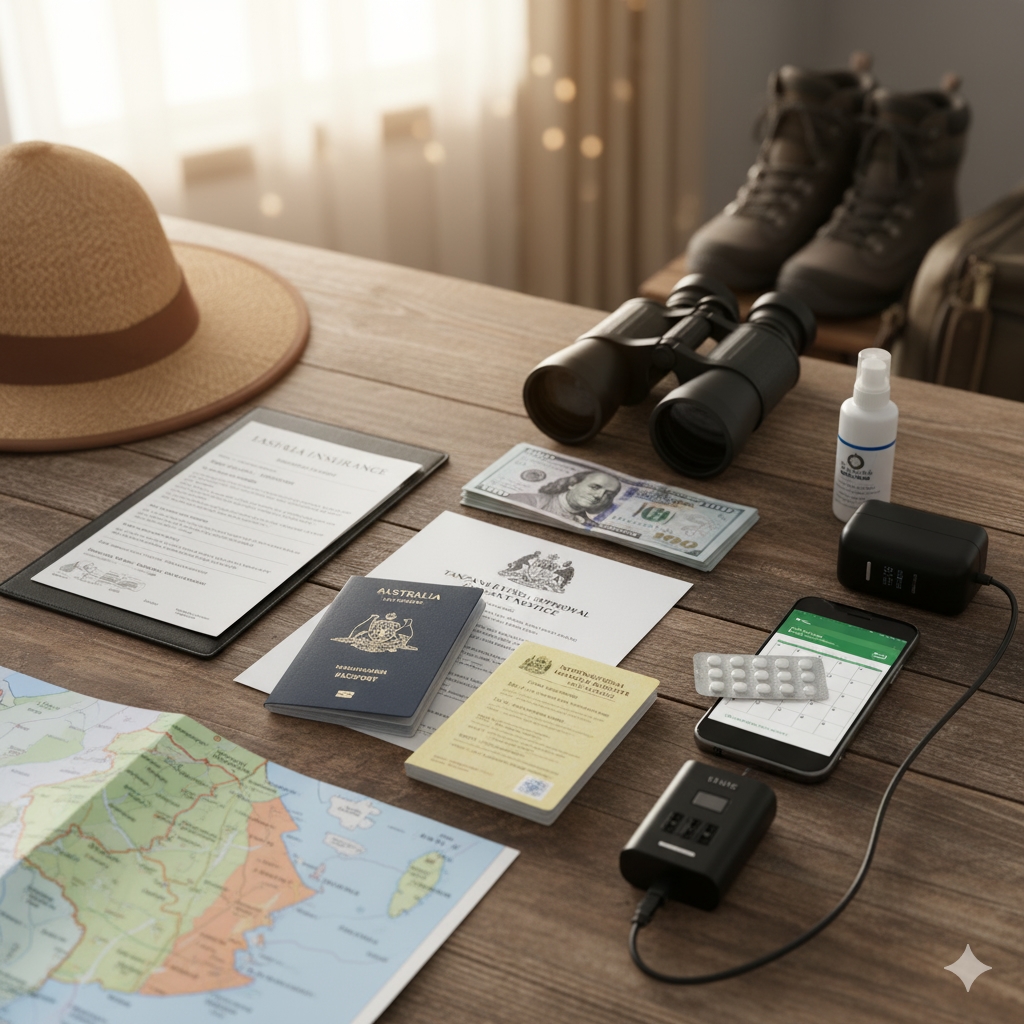
Tanzania eVisa FAQs
Q: Can I use the Tanzania eVisa to visit both mainland Tanzania and Zanzibar?
A: Yes — the eVisa for the United Republic of Tanzania covers both the mainland and the Zanzibar archipelago. Many travel advice sites treat both together.
Q: What if I change my travel dates after I’ve been granted the eVisa?
A: Usually you can still travel on the visa as long as it remains valid and you enter before its expiry. But if your entry is significantly delayed or your passport changes, you should check with immigration to be safe.
Q: What if I lose my printed eVisa in Australia or en-route?
A: As long as you have the PDF or an email copy somewhere, you may still be okay. But it's wise to carry a printed copy and perhaps a screenshot in your phone + email backup for safety.
Q: If I arrive by land border (not by air) is the eVisa accepted?
A: Usually yes — but check that your particular border accepts the eVisa format. Some land borders may only accept VOA or specific documentation. For example one forum post warns: “If you are entering at any land border other than Namanga or Tunduma, do not waste your time trying to apply for an eVisa.”
Q: Do I need health insurance to apply for the eVisa?
A: The online eVisa application does not always require proof of travel insurance. But you’ll want travel insurance anyway for your trip. Some tour-operator sources may mention mandatory travel insurance for Zanzibar from certain dates.
Q: If I already have a multiple-entry visa for another African country (say Kenya), can I enter Tanzania without a separate visa?
A: No — visa policies are specific. A Kenyan visa doesn’t automatically allow Tanzania entry. You’d still need the Tanzania visa.
Q: Can I work in Tanzania using a tourist/business eVisa?
A: No — employment (being hired locally or working for a Tanzanian company) normally requires a proper work permit, not just a tourist/business visa.
